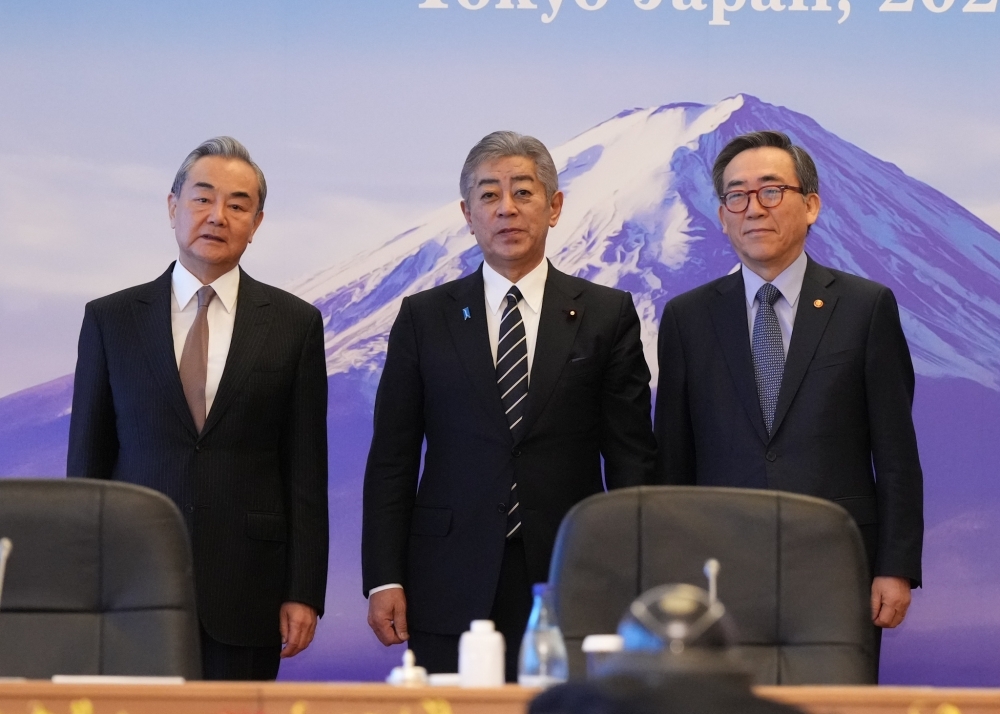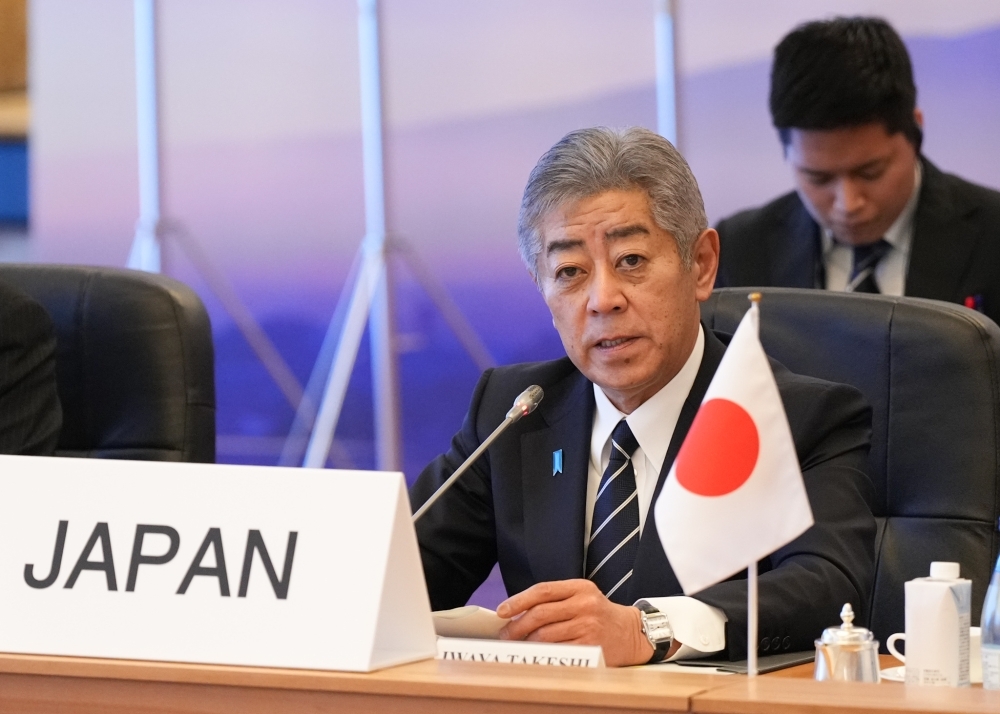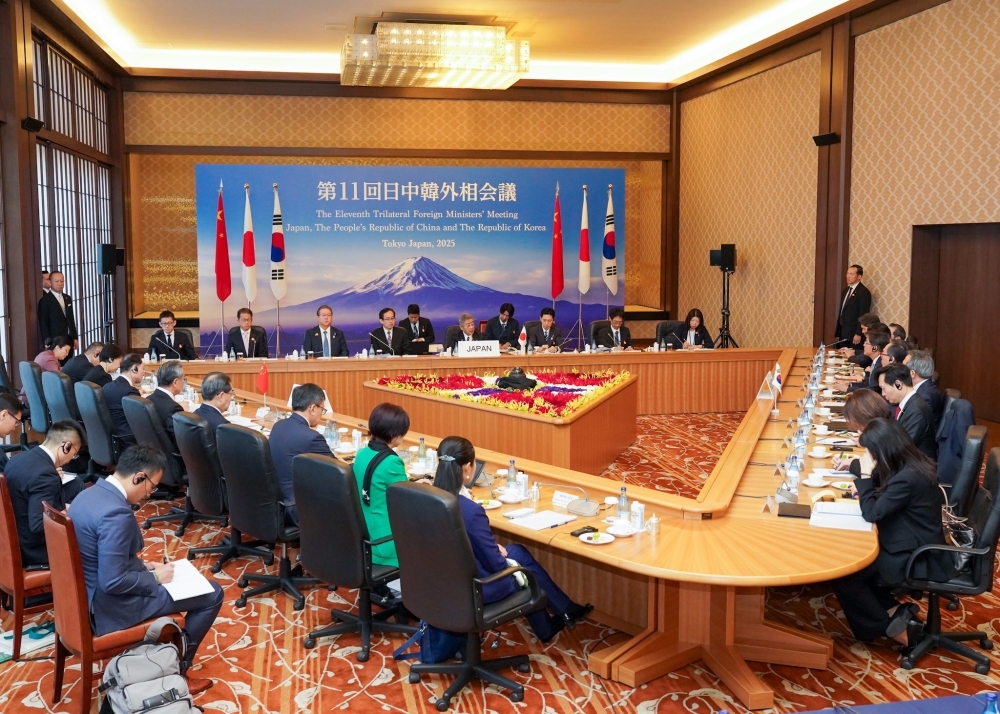Press Releases
The Eleventh Japan-China-ROK Trilateral Foreign Ministers’ Meeting



On March 22, commencing at 9:10 a.m. for approximately 80 minutes, the Eleventh Trilateral Foreign Ministers' Meeting between Japan, the People's Republic of China and the Republic of Korea was held at Iikura Guest House. (attendees: Mr. IWAYA Takeshi, Minister for Foreign Affairs of Japan [Chair], His Excellency Mr. WANG Yi, Foreign Minister of the People's Republic of China, His Excellency Mr. CHO Tae-Yul, Minister of Foreign Affairs of the Republic of Korea). The overview of the meeting is as follows.
1 Trilateral Cooperation
- Minister Iwaya, referring to the significant influence and responsibilities for the peace and prosperity of the region and the international community shared by Japan, China and the ROK, stated that enhancing future-oriented exchanges and cooperation of the three countries holds great significance. Minister Wang and Minister Cho also stated about the importance or trilateral cooperation.
- The three Ministers concurred on promoting a future-oriented cooperation for the next Trilateral Summit based on the outcomes of the last Summit and accelerating preparation to achieve concrete outcomes, focusing on the following three areas;
- A. Knowing each other better
- B. Cooperation to shape and protect the livelihoods
- C. Joint efforts of all generations to tackle common challenges
- The three Ministers welcomed "Opening ceremony of the Year of Japan-China-ROK Cultural Exchange 2025-2026” to be held in Tokyo on April 14 and various related events to be held throughout the Year.
- The three Ministers welcomed the signing of the “Protocol Amending the Agreement on the Establishment of the Trilateral Cooperation Secretariat” to strengthen mid- and long-term efforts by TCS. Minister Iwaya expressed his expectations for TCS’s further contribution to the promotion of cooperative relations among the three countries.
2 Regional and Global Situations
(1) North Korea
Minister Iwaya expressed his concern over North Korea's nuclear and missile activities, cryptocurrency thefts and the advancement of the military cooperation between Russia and North Korea. Minister Iwaya also pointed out that the denuclearization of North Korea in accordance with the United Nations Security Council resolutions is the common goal of the three countries and stated that he would like to closely communicate with them, including the full implementation of the UNSC resolutions. In addition, Minister Iwaya asked for continued understanding and cooperation for the immediate resolution of the abductions issue.
(2) Situation in Ukraine
The three Ministers exchanged views on the current situation in Ukraine. In this context, Minister Iwaya stated that it is necessary to stay united in making the case that unilateral attempts to change the status quo by force should not be tolerated anywhere in the world.
(3) Cooperation in East Asia
Minister Iwaya stated that further strengthening cooperation between ASEAN, which forms the core of the regional framework, and Japan, China and the ROK is important from the perspective of expanding the outcomes of trilateral cooperation to the entire region. He then stated that he would like to strengthen cooperation between ASEAN and Japan, China, and the ROK, while continuing to respect the ASEAN Centrality. Minister Iwaya also stated that he would like to support the promotion and mainstreaming of ASEAN Outlook on the Indo-Pacific (AOIP) in cooperation with China and the ROK.
The three Ministers also concurred on cooperating for the success of the 2025 APEC chaired by the ROK. Moreover, Minister Iwaya and Minister Cho expressed their supports for the 2026 China APEC Chair, and Minister Wang and Minister Cho expressed their supports for the 2031 Japan APEC Chair.
3 Trilateral Summit Meeting
The three Ministers concurred on expediting preparation for holding the Trilateral Summit at the earliest convenient time.
(Reference)
The three leaders concurred at the Trilateral Summit last May to cooperate in six areas: 1) People to People Exchanges, 2) Sustainable Development including through Climate Change Response, 3) Economic Cooperation and Trade, 4) Public Health and Ageing Society, 5) Science and Technology Cooperation, Digital Transformation, 6) Disaster Relief and Safety

